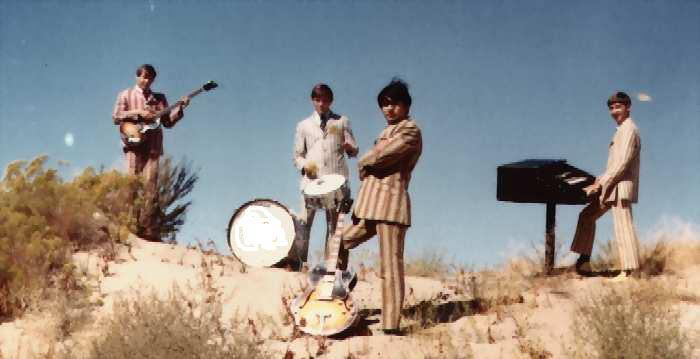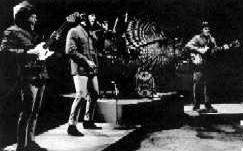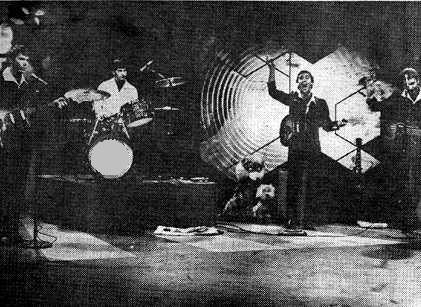1964
When the lads heard the news that Leach had
turned down the contract with Triumph, they were furious. Anthony attempted to
contact Joe Meek directly, but Meek refused their calls. Understandably livid,
and fortified by a long night of heavy drinking, the boys made a 2:00 AM “house
call,” confronting Reggie in his swanky Northern Quarter flat.
A brief scrap ensued, and the boys quickly
overpowered Leach, confiscating his books.
After a quick review, they were astonished
to discover that Reggie had been skimming an extra twenty percent in addition to his agreed-upon commission of ten percent plus expenses, classifying the padded
fees as “booking taxes.” Further examination revealed that Reggie's "expenses"
included the price of his 12th-floor flat with a view, his brand-new
Mini Cooper, regular trips to the local "massage" parlor and a standing tab
at over a dozen local pubs, clubs and drinking establishments.
his agreed-upon commission of ten percent plus expenses, classifying the padded
fees as “booking taxes.” Further examination revealed that Reggie's "expenses"
included the price of his 12th-floor flat with a view, his brand-new
Mini Cooper, regular trips to the local "massage" parlor and a standing tab
at over a dozen local pubs, clubs and drinking establishments.
Suffice it to say that Reggie's “services”
for The Dover Souls ended that night with a trip to hospital, a broken collar
bone, and 53 stitches. (Smithe-Jones later based his humorous song,
“Fifty-Three Stitches and the Boot,” about the incident) .
 Anthony,
by default, became the band's manager, and they continued on with their familiar
and frenetic pattern of a different gig in a different city every night. Except
for a group of loyal fans, however, the general public beyond northwest England
had little knowledge of The Dover Souls.
Anthony,
by default, became the band's manager, and they continued on with their familiar
and frenetic pattern of a different gig in a different city every night. Except
for a group of loyal fans, however, the general public beyond northwest England
had little knowledge of The Dover Souls.
The boys, believing in each other and their
talent, pressed on through 1964. Nigel became friendly with
Brian Epstein, manager of
The Beatles and
Gerry and the Pacemakers (Editor's Note: as it would later be revealed, Nigel
was a closeted homosexual at the time, and there were rumors about his possible
"liaisons" with Epstein—none of which are supported by a shred of evidence.).
Nigel approached Brian with the idea of becoming the Soul's manager.
Though interested, Epstein was far too busy
with his other clients. He nevertheless agreed to meet with the boys at the
Cavern Club, where he discussed their best chances for success and allegedly
introduced them to
marijuana.
Brian ended up recommending the lads to
producer
Dick Rowe at
Decca Records. Rowe agreed to audition the Souls.
Best known as “The Man Who Turned Down
The Beatles” only a few years earlier, Rowe had told Brian Epstein that
"guitar bands are on their way out.”
He was also, however, the man who signed
The Rolling Stones to their first record deal.
On November 17, 1964, The Dover Souls met
Dick Rowe at
Decca Studios in London.
The Dover Souls played three songs for
Rowe: “Misty Monday Morning,” “Forget Me Not” and “Be My Luv.” Rowe was
unimpressed, but agreed to allow the group enough studio time to record one demo
song. He tapped
Tony Meehan, ex-drummer for
The Shadows, to produce the session. When long-time fan, Marianne Faithful,
heard her beloved Souls were recording, she brought her friends,
Mick Jagger and
Keith Richards, to the studio to listen in.
 On
November 24, 1964, the band recorded their demo of “Misty Monday Morning.” Mick
and Keith, who took an instant liking to Smithe-Jones, later sat in for a
spirited rendition of
Kansas City with the Souls that, unfortunately, was performed after the tape
machines were turned off. Thus began a long friendship between Mick and Anthony.
(Anthony with the Stones at left).
On
November 24, 1964, the band recorded their demo of “Misty Monday Morning.” Mick
and Keith, who took an instant liking to Smithe-Jones, later sat in for a
spirited rendition of
Kansas City with the Souls that, unfortunately, was performed after the tape
machines were turned off. Thus began a long friendship between Mick and Anthony.
(Anthony with the Stones at left).
After talking it over with his associates
at the Decca offices, however, Rowe decided to pass on signing the band.
Main Page
Early History
Forming the Band
1964 The Hit
1965 The
Break-up Anthony in New York
Honey Vicarro
1966-Lads In UK
The Reunions
The Tragedy
Smithe-Jones Bio
Biggs Bio
Tolliver Bio St. John Bio
Discography
Webmistress
 his agreed-upon commission of ten percent plus expenses, classifying the padded
fees as “booking taxes.” Further examination revealed that Reggie's "expenses"
included the price of his 12th-floor flat with a view, his brand-new
Mini Cooper, regular trips to the local "massage" parlor and a standing tab
at over a dozen local pubs, clubs and drinking establishments.
his agreed-upon commission of ten percent plus expenses, classifying the padded
fees as “booking taxes.” Further examination revealed that Reggie's "expenses"
included the price of his 12th-floor flat with a view, his brand-new
Mini Cooper, regular trips to the local "massage" parlor and a standing tab
at over a dozen local pubs, clubs and drinking establishments.  Anthony,
by default, became the band's manager, and they continued on with their familiar
and frenetic pattern of a different gig in a different city every night. Except
for a group of loyal fans, however, the general public beyond northwest England
had little knowledge of The Dover Souls.
Anthony,
by default, became the band's manager, and they continued on with their familiar
and frenetic pattern of a different gig in a different city every night. Except
for a group of loyal fans, however, the general public beyond northwest England
had little knowledge of The Dover Souls. 
